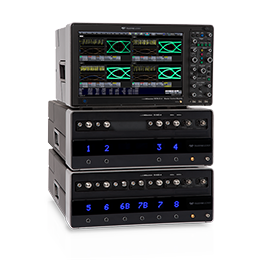Teledyne LeCroy - PXP-100B PCI Express® Test Platform
- Provides a passive PCIe® backplane for test applications
- Self-contained, portable and self-powered
- Supplies power for +3.3V, +3.3Vaux and +12V rails
- Generates PCIe reference clock
- Accepts external clock inputs
- Generates valid PERST# bus reset that can be activated by manual push button
- Includes two mid-bus probe footprints for traffic monitoring
- Supports two PCIe x16 sockets which accept cards of any link width (x1, x4, x8, x16)
- Provides indication of valid connection of PRSNT1# and PRSNT2# lines for each card
- Supports data rates of 2.5 GT/s and 5.0 GT/s
The Teledyne LeCroy PXP-100B Test Platform provides a convenient means for testing PCIe 2.0 add-in cards with a self-contained portable and powered passive backplane. The PXP-100B provides power required for both cards under test, and an interposer can be used for connection to a protocol analyzer. As an alternative to an interposer, the PXP-100B includes two mid-bus probe footprints to allow connection to an analyzer via a mid-bus probe.
Full-featured, convenient and portable, the PXP-100B simplifies the experimental setup during testing of new PCIe products.
Teledyne LeCroy is the main supplier of protocol analyzers and exercisers to companies developing SSD and other similar storage products using the new NVMe, SATA Express and SCSI Express high-speed serial data standards. Protocol analyzers and exercisers are used by developers and validation engineers to directly record and examine data traffic on serial data communication links between devices and systems. This equipment enables developers to reduce debug and test schedules, lower engineering development costs on new products and meet aggressive time-to-market requirements.
As storage developers make the transition from legacy SAS and SATA protocol-based SSDs to the more advanced NVMe and SATA Express technologies, they are encountering limitations in available design and test tools including limited trace recording times and a lack of standardized analysis reports for PCIe-based storage. These two issues are significant for the newer technologies of NVMe and SATA Express due to the following:
- High performance SSD testing can require recording data traffic beyond a few minutes. This is not possible for many protocol analyzers due to limitations in their recording architectures.
- While some test tool suppliers have claimed support for the NVMe and SATA Express protocols, support for these protocols has remained minimal. This has hampered developer's productivity due to the use of reporting systems designed for the older technologies, which are not optimized for quality testing on NVMe and SATA Express products.
The Summit T34 protocol analyzer, specifically targeted at PCIe storage applications, now supports long trace recordings with a new NVMe Enhanced Mode. The Summit T34 can also be configured with up to 64 GB of trace recording memory. NVMe Enhanced Mode builds on and optimizes the existing deep buffer memory to allow users long recording time capability. Depending on the speed of the DUT (Device Under Test), the recording time can be maximized to up to several hours for a single trace capture. This feature is useful for tasks such as measuring performance or determining how well your Queue handling algorithms are functioning. An example of the metrics that are now available include the ability to measure the NVMe queue distribution over a sustained period of time. The ability to gather queue behavior for long periods helps driver and OS developers fine tune their applications and balance queue loads for optimized product performance.
With over a decade of experience in providing PCI Express, SAS/SATA and other serial data protocols with standardized error analysis and product performance reports, Teledyne LeCroy has now created an NVMe and SATA Express SSD Performance and Analysis capability. Trace Expert™, a new feature in the PCIe Protocol Suite, creates a detailed report that the SSD industry requires to obtain a common understanding of how their SSD or storage systems are operating and includes information on the necessary PCIe based components. Information such as NVMe queues, commands, doorbell and control registers and many other metrics are captured, analyzed and organized into a detailed report providing developers a comprehensive status document for their products including a wide range of performance statistics.
In addition to the standard storage protocols, all of our NVMe platforms also fully support, Trusted Computer Group (TCG), Single Root I/O Virtualization (SRIOV), Multi-Root I/O Virtualization (MRIOV) and Address Translation Services (ATS). A full list of capabilities, views and reports can be found on the product pages (listed below) for each of our analyzers.
NVMe over PCIe Specification Decoding and Analysis - NVMe Initialization Decoding
- Decode NVMe Commands
- Analyze NVMe Queues
- NVMe Multiple Pointer Based Transactions
- NVMe Power Management
- Extract the PCIe SSD Base Address automatically









